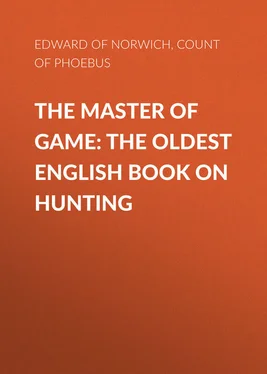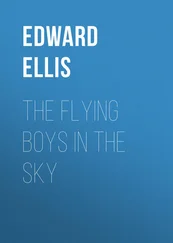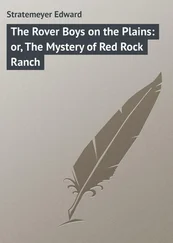Edward Array - The Master of Game - The Oldest English Book on Hunting
Здесь есть возможность читать онлайн «Edward Array - The Master of Game - The Oldest English Book on Hunting» — ознакомительный отрывок электронной книги совершенно бесплатно, а после прочтения отрывка купить полную версию. В некоторых случаях можно слушать аудио, скачать через торрент в формате fb2 и присутствует краткое содержание. Жанр: Хобби и ремесла, foreign_antique, foreign_prose, на английском языке. Описание произведения, (предисловие) а так же отзывы посетителей доступны на портале библиотеки ЛибКат.
- Название:The Master of Game: The Oldest English Book on Hunting
- Автор:
- Жанр:
- Год:неизвестен
- ISBN:нет данных
- Рейтинг книги:5 / 5. Голосов: 1
-
Избранное:Добавить в избранное
- Отзывы:
-
Ваша оценка:
- 100
- 1
- 2
- 3
- 4
- 5
The Master of Game: The Oldest English Book on Hunting: краткое содержание, описание и аннотация
Предлагаем к чтению аннотацию, описание, краткое содержание или предисловие (зависит от того, что написал сам автор книги «The Master of Game: The Oldest English Book on Hunting»). Если вы не нашли необходимую информацию о книге — напишите в комментариях, мы постараемся отыскать её.
The Master of Game: The Oldest English Book on Hunting — читать онлайн ознакомительный отрывок
Ниже представлен текст книги, разбитый по страницам. Система сохранения места последней прочитанной страницы, позволяет с удобством читать онлайн бесплатно книгу «The Master of Game: The Oldest English Book on Hunting», без необходимости каждый раз заново искать на чём Вы остановились. Поставьте закладку, и сможете в любой момент перейти на страницу, на которой закончили чтение.
Интервал:
Закладка:
As of the hinds some be barren and some bear calves, of those that be barren their season beginneth when the season of the hart faileth and lasteth till Lent. And they which bear calves, in the morning when she shall go to her lair she will not remain with her calf, but she will hold (keep) him and leave him a great way from her, and smiteth him with the foot and maketh him to lie down, and there the calf shall remain always while the hind goeth to feed. And then she shall call her calf in her language and he shall come to her. And that she doeth so that if she were hunted her calf might be saved and that he should not be found near her. The harts have more power to run well from the entry of May into St. John's tide 51 51 Nativity of St. John the Baptist, June 24.
than any other time, for then they have put on new flesh and new hair and new heads, for the new herbs and the new coming out (shoots) of trees and of fruits and be not too heavy, for as yet they have not recovered their grease, 52 52 See Appendix: Grease.
neither within nor without, nor their heads, wherefore they be much lighter and swifter. But from St. John's into the month of August they wax always more heavy. Their skin is right good for to do many things with when it is well tawed and taken in good season. Harts that be in great hills, when it cometh to rut, sometimes they come down into the great forests and heaths and to the launds (uncultivated country) and there they abide all the winter until the entering of April, and then they take to their haunts for to let their heads wax, near the towns and villages in the plains there where they find good feeding in the new growing lands. And when the grass is high and well waxen they withdraw into the greatest hills that they can find for the fair pastures and feeding and fair herbs that be thereupon. And also because there be no flies nor any other vermin, as there be in the plain country. And also so doth the cattle which come down from the hills in winter time, and in the summer time draw to the hills. And all the time from rutting time into Whitsunday great deer and old will be found in the plains, but from Whitsunday 53 53 This sentence reads somewhat confusedly in our MS., so I have taken this rendering straight from G. de F., p. 23.
to rutting time men shall find but few great deer save upon the hills, if there are any (hills) near or within four or five miles, and this is truth unless it be some young deer calved in the plains, but of those that come from the hills there will be none. And every day in the heat of the day, and he be not hindered, from May to September, he goes to soil though he be not hunted.
CHAPTER IV
OF THE BUCK AND OF HIS NATURE
A buck is a diverse beast, he hath not his hair as a hart, for he is more white, and also he hath not such a head. He is less than a hart and is larger than a roe. A buck's head is palmed with a long palming, and he beareth more tines than doth a hart. His head cannot be well described without painting. They have a longer tail than the hart, and more grease on their haunches than a hart. They are fawned in the month of June and shortly to say they have the nature of the hart, save only that the hart goeth sooner to rut and is sooner in his season again, also in all things of their kind the hart goeth before the buck. For when the hart hath been fifteen days at rut the buck scarcely beginneth to be in heat and bellow.
And also men go not to sue him with a lymer, nor do men go to harbour him as men do to the hart. Nor are his fumes put in judgment as those of the hart, but men judge him by the foot other head as I shall say more plainly hereafter.
They crotey their fumes in diverse manners according to the time and pasture, as doth the hart, but oftener black and dry than otherwise. When they are hunted they bound again into their coverts and fly not so long as doth the hart, for sometimes they run upon the hounds. 54 54 They do not make such a long flight as the red deer but by ringing return to the hounds.
And they run long and fly ever if they can by the high ways and always with the change. They let themselves be taken at the water and beat the brooks as a hart, but not with such great malice as the hart, nor so gynnously (cunningly) and also they go not to such great rivers as the hart. They run faster at the beginning than doth the hart. They bolk (bellow) about when they go to rut, not as a hart doth, but much lower than the hart, and rattling in the throat. Their nature and that of the hart do not love (to be) together, for gladly would they not dwell there where many harts be, nor the harts there where the bucks be namely together in herds. The buck's flesh is more savoury 55 55 G. de F., p. 29, completes the sense of this sentence by saying that "the flesh of the buck is more savoury to all hounds than that of the stag or of the roe, and for this reason it is a bad change to hunt the stag with hounds which at some other time have eaten buck."
than is that of the hart or of the roebuck. The venison of them is right good if kept and salted as that of the hart. They abide oft in a dry country and always commonly in herd with other bucks. Their season lasteth from the month of May into the middle of September. And commonly they dwell in a high country where there be valleys and small hills. He is undone as the hart.
CHAPTER V
OF THE ROE AND OF HIS NATURE
The roebuck is a common beast enough, and therefore I need not to tell of his making, for there be few men that have not seen some of them. It is a good little beast and goodly for to hunt to whoso can do it as I shall devise hereafter, for there be few hunters that can well devise his nature. They go in their love that is called bokeyng in October, 56 56 This is wrong; they rut in the beginning of August. See Appendix: Roe.
and the bucking of them lasteth but fifteen days or there about. At the bucking of the roebuck he hath to do but with one female for all the season, and a male and a female abide together as the hinds 57 57 A clerical error. G. de F. (p. 36) says, "as do birds," which makes good sense.
till the time that the female shall have her kids; and then the female parteth from the male and goeth to kid her kids far from thence, for the male would slay the young if he could find them. And when they be big that they can eat by themselves of the herbs and of the leaves and can run away, then the female cometh again to the male, and they shall ever be together unless they be slain, and if one hunt them and part them asunder one from another, they will come together again as soon as they can and will seek each other until the time that one of them have found the other. And the cause why the male and the female be evermore together as no otherst in this world, is that commonly the female hath two kids at once, one male and the other female, and because they are kidded together they hold evermore together. And yet if they were not kidded together of one female, yet is the nature of them such that they will always hold together as I have said before. When they withdraw from the bucking, they mew their heads, for men will find but few roebucks that have passed two years that have not mewed their heads by All Hallowtide. And after the heads come again rough as a hart's head, and commonly they burnish their horns in March. The roebuck hath no season to be hunted, for they bear no venison 58 58 See Appendix: Grease.
but men should leave them the females for their kids that would be lost unto the time that they have kidded, and that the kids can feed themselves and live by themselves without their dame. It is good hunting for it lasteth all the year and they run well, and longer than does a great hart in higason time. Roebucks cannot be judged by their fumes, and but little by their track as one can of harts, for a man cannot know the male from the female by her feet or by her fumes.
Интервал:
Закладка:
Похожие книги на «The Master of Game: The Oldest English Book on Hunting»
Представляем Вашему вниманию похожие книги на «The Master of Game: The Oldest English Book on Hunting» списком для выбора. Мы отобрали схожую по названию и смыслу литературу в надежде предоставить читателям больше вариантов отыскать новые, интересные, ещё непрочитанные произведения.
Обсуждение, отзывы о книге «The Master of Game: The Oldest English Book on Hunting» и просто собственные мнения читателей. Оставьте ваши комментарии, напишите, что Вы думаете о произведении, его смысле или главных героях. Укажите что конкретно понравилось, а что нет, и почему Вы так считаете.












